Forbidden Broadway: Behind the Mylar Curtain (10 page)
Read Forbidden Broadway: Behind the Mylar Curtain Online
Authors: Gerard Alessandrini,Michael Portantiere

Every night, there would be limousines in front of Palsson's. People like Christopher Reeve, Carrie Fisher, Paul Simon, and Jonathan Demme came to see the show. Our biggest thrill was when Ethel Merman arrived with a whole entourage of theatre
luminaries. She stayed around afterwards, and we had a great time talking with her.
She asked the four of us, "So, what shows have you kids done on Broadway?" We looked
at each other, and Nora said, "None, Miss Merman. That's the point!" There was an
awkward silence. Merman didn't really get it.
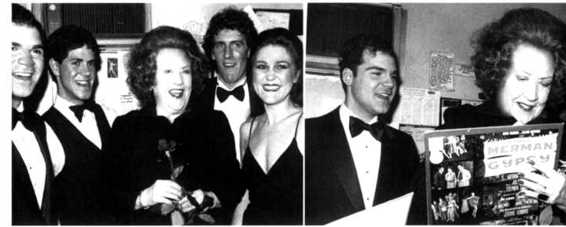
The great Ethel Merman at Forbidden Broadway.
One night, this very nice man from CBS was in the audience. He came up to me
and said, "Do you know why all these stars are coming to your show?" I said, "No!" He
said, "Rex Reed loved the show and he's written a full-page, rave review. But before it
runs, he's been calling all his favorite celebrities and telling them to go see Forbidden
Broadway-because after his review hits the paper, nobody will be able to get a ticket
for a year."
When that review finally appeared, it opened up the floodgates, and all of the other
papers ran reviews. The Times really embraced the show; they not only printed a rave
by Mel Gussow, but there was a follow-up review on Sunday, and then I was featured
on the front page of the Friday Arts & Leisure section. Later, Frank Rich wrote about
Forbidden Broadway, and he didn't love the show the first time he saw it. In his season
round-up piece, he wrote, "It's a merry entertainment but also an uneven one." I was
disappointed, but he was probably correct; the show did improve the more I worked
on it over the years.
My euphoria over the response from audiences, celebrities, and critics was
tempered by the realities of showbiz. Besides not knowing how to write special
material for the new girl, I recall feeling that she wasn't very grateful about being
in the show. She used to constantly complain that I had given Nora and myself
all the good material; she actually told me, "I don't want to be in The Nora and
Gerard Show." It got so bad that one afternoon she came in and removed all the
costumes and props in order to stop us from going on. The rest of us arrived at
Palsson's and saw that everything was missing. Nora said, "What the hell, we'll do
the show anyway!"
So we re-divided all of the numbers between Nora, Bill, and me. The only thing we
couldn't figure out how to do was the Merman-Martin duet. Nora said, "That's easy.
I'll still do Merman, and Gerard, you can be Fernando Llamas!" But when the new girl
heard that we were going on without her, she ran back to Palsson's with the costumes
and props. She did the whole performance in tears. Needless to say, the audience was
baffled as to exactly what kind of show they were seeing.
In those days, the costumes weren't as elaborate as they were later. We'd start out
dressed as waiters, in tuxes and basic black. Nora had an Annie costume. In my closet,
I had found a gorgeous Kismet costume that my aunt, Zia Nina (who once worked
for Adrian), had designed, and I used that for Yul Brynner in the King and I number.
Nora made aprons for the Fiddler number, and she had two '50s dresses that we used
for Merman and Martin.
After the incident of the stolen costumes, Sella Palsson advised me to
hire another woman as a standby so
we could still do the show if someone
was out. One of my best friends, Chloe
Webb, had just come to New York to
be in Once a Catholic, but she was replaced during rehearsals. I knew she
was an exceptional talent, so I asked
her if she'd like to stand by in Forbidden Broadway, and she agreed. Even
during rehearsals, everyone could tell
that she was a hundred times better
than the other girl. Sella said, "I think
you need to make a cast change. This
is a business, and sometimes you have
to replace people to keep things running smoothly." So the other girl was
out, and Chloe was in.
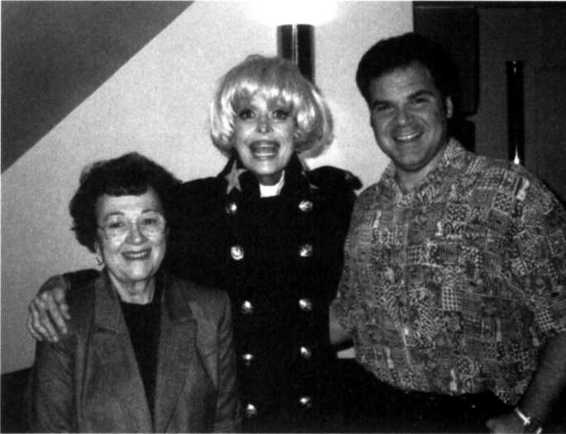
The real Carol Channing with Gerard and his mother, Florinda.
When Carol Channing had come to see the show, she had told me afterwards that
she loved it but felt a little hurt because she wasn't included. So I wrote a Channing
number for Chloe, "Dolly Is a Girl's Best Friend." Believe it or not, Charles LoweChanning's husband and a great fan of Forbidden Broadway-had called me up very
early one morning and made suggestions about spoofing Carol, going so far as to
suggest how we should do the hair and makeup. I-Ie said it would bring the house
down, and for many years, it did.
Carol is one celebrity who really embraced Forbidden Broadway early on. I assume that's not only due to her legendary sense of humor and her status as one of
the greatest satirical chanteuses of the twentieth century, but also because she has a
musical-revue background. Most famously she starred in Gower Champion's revue
Lend an Ear long before Gentlemen Prefer Blondes and Hello, Dolly!
Whenever I speak with Carol, she likes to remind me that it was she who first
brought Mary Martin and then Ethel Merman to see our show. The night she came
with Merman, my mother, Florinda, was also in attendance. Carol told me that, right
after the show, my mother ran up to her and Merman to apologize profusely for what
I, her son, had written. She said, "Please pay no attention to anything my son says in
the show. He really loves you and is a great fan of you both, so please forgive him."
According to Carol, every time my "sweet little Italian mother" encountered her from
then on, she would apologize again and bless her. Carol was both amused and touched
by this, and she and my mother have long since become good friends.
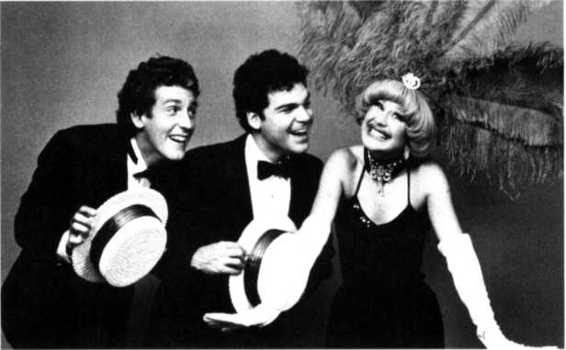
Bill Carmichael, Gerard Alessandrini, and Chloe Webb (as Carol
Charming).
Carol quickly became part of the
FB family. In fact, she's featured on
one of our cast albums, Forbidden
Broadway: Volume 3. I wrote a specialty number for her, "Imitation Is the
Sincerest Form of Flattery," wherein
she teaches the cast how to do a Carol
Charming imitation. At the start of her
career, Carol had been known for her
imitations of Carmen Miranda and
Marlene Dietrich, so I also wrote mini
spoofs of those icons for her to do on
the recording. She has continued to
be a supporter of our show through
the years, returning frequently to see
us and almost always bringing another big star along with her.
The show suddenly seemed more complete with Chloe Webb on board and with
the Charming number in place. That's when Equity came in. Nora and I were both in
the union, but we assumed that since we were performing in a nightclub, it wasn't an
issue. At that time, the King Cole Room at the St. Regis Hotel had songwriter revues with
some major stars. Equity really wanted
to work up a contract for those shows,
and I think they turned their attention
on us to strong-arm the St. Regis. The
funny thing is that, when we had first
started doing Forbidden Broadway
at Palsson's, I had gone to Equity and
asked for help to make sure I was doing
everything right, but they basically said,
"We can't be bothered with something
minor like this."
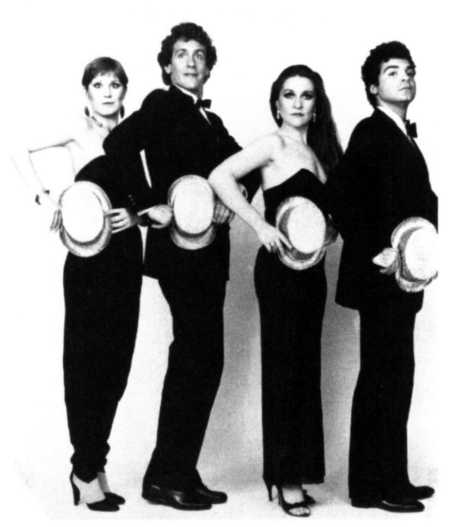
Chloe Webb, Bill Carmichael, Nora Mae Lyng, and
Gerard Alessandrini.
Four months later, they changed
their tune. They came to us and said,
"This is an Equity show and you need
to post a $10,000 bond." At that point,
I was living on about $200 a week. I
didn't know how to make money
from the show, and there was no way
I could come up with $10,000. But the Palsson's booking manager was trying to gain ownership of Forbidden Broadway, so
he posted the bond. Equity recognized him as the producer and sent us a contract.
A registered letter told us we had to sign it or we'd get a cease and desist notice.
Nora and I read the contract in shock.Then the "bad seed" gene that we share came
out. We looked at each other and laughed maniacally. Nora said, "Let's send this back
unsigned!" I said, "No! Let's send a nasty note or a dirty lyric!" Nora, always ready to
one-up me, said, "No! Let's smear the contract with liver pate from the kitchen. By
the time it gets to Equity, it will stink to high heaven." So we
smeared the smelly pate all over the papers, as thick as we
could, and mailed them back to the union unsigned. Later
that night, Sella came up to us accusingly and asked, "Did the
two of you eat all of our liver pate?" When we confessed to
her what we had done, she expressed concern about the way
things were going.
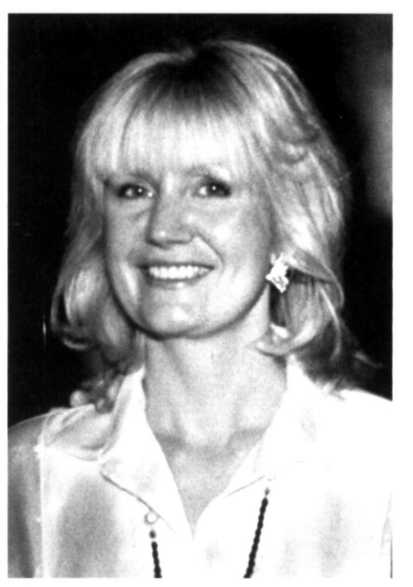
Sella Palsson.
Sella and I started talking about how the money from ticket
sales was being distributed, and in comparing notes, we realized that the booking manager was taking more than we knew.
He was paying the cast in cash after the show, one dollar per
ticket. He'd take $65 and go, "One for Bill, one for Nora, one for
Gerard." I'd leave very excited with about $18 in cash, thinking
it was a good night's salary. It wasn't till later that I discovered
how much the show was actually making.
Sella took me to a lawyer named Jay Julian, a sharp showbiz
veteran who set us straight. The booking manager got his own
lawyer and sued me for control of the show, but fortunately
I had established copyright, and he couldn't infringe on that.
So we agreed on a settlement in order to get him to go away.
Then Sella and Jay set up a production company for us called
"Playkill." Sella managed the show from that point on, and she did a wonderful, honest job of it. She was incredibly supportive and loving to all involved, and we became
great friends. She was also very tolerant of my "angry young man" outbursts, which
provided her with plenty of offstage melodrama and, I'm sure, comedy.